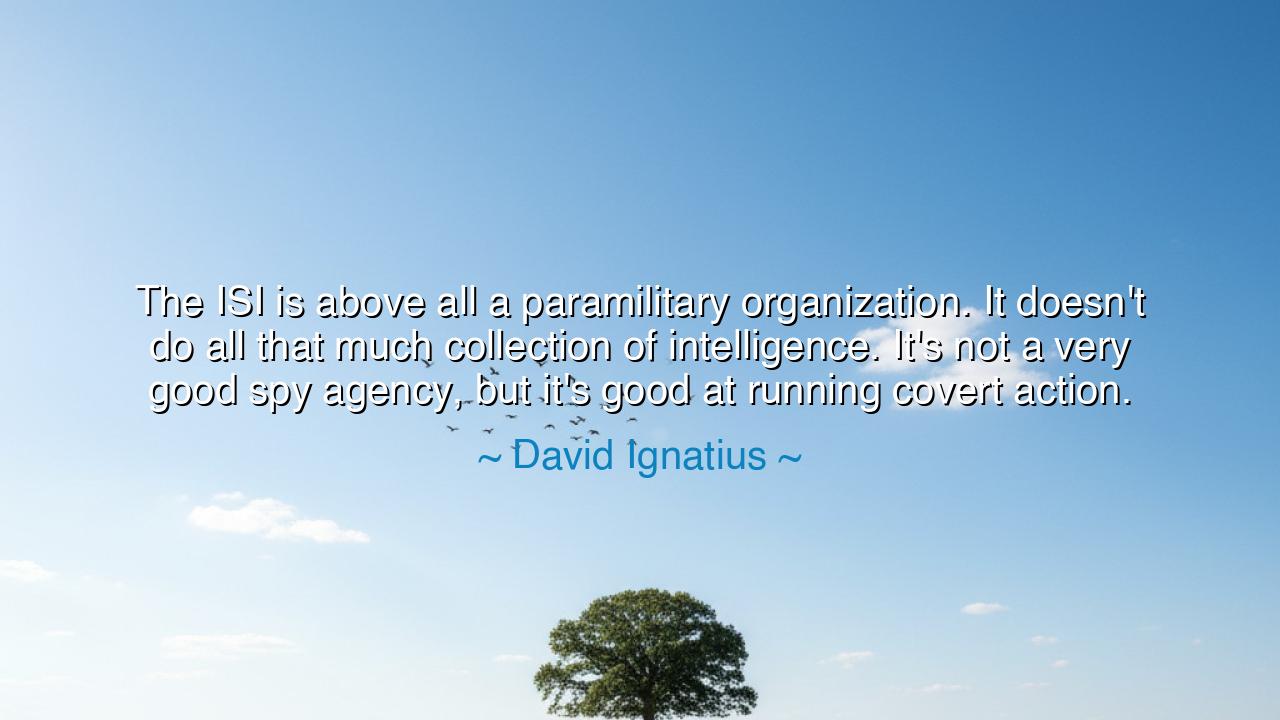
The ISI is above all a paramilitary organization. It doesn't do
The ISI is above all a paramilitary organization. It doesn't do all that much collection of intelligence. It's not a very good spy agency, but it's good at running covert action.






The words “The ISI is above all a paramilitary organization. It doesn’t do all that much collection of intelligence. It’s not a very good spy agency, but it’s good at running covert action,” were spoken by David Ignatius, a journalist and thinker who has long studied the secret machinery of nations. Though they describe a modern institution—the Inter-Services Intelligence of Pakistan—their meaning reaches into the timeless truths of power, secrecy, and the double-edged nature of human ambition. For in every age, there have been those who operate in the shadows, whose work is not in gathering truth, but in shaping events unseen. Ignatius’s observation is not merely political—it is a reflection on how force and cunning, when unbalanced by wisdom, can turn an agency of intelligence into an engine of action without understanding.
The ISI, born in the turbulent years after the partition of India and Pakistan, was designed to protect a fragile nation from enemies seen and unseen. Yet, as Ignatius notes, its nature became less that of a spy agency—whose power lies in knowledge—and more that of a paramilitary force, whose power lies in action. This is the heart of his insight: that knowledge without restraint is harmless, but action without understanding is perilous. To “run covert action” without the foundation of intelligence is to act without sight—to strike in darkness and call it strategy.
History is filled with examples of such imbalance. Consider the Athenians in the Peloponnesian War, who, in their thirst for dominance, launched the Sicilian Expedition without true understanding of their enemy or of their own limits. They acted with force, but without insight. Their fleet was mighty, their soldiers brave—but ignorance steered the helm. The result was ruin. So too, Ignatius implies, when an institution forgets its purpose—to see, to know, to understand—it may become strong in deed but blind in vision, and its victories will sow the seeds of its undoing.
The deeper wisdom in this quote lies in the distinction between knowledge and control. The spy, in the truest sense, is the seeker of truth—patient, silent, observant. The paramilitary, by contrast, is the wielder of power—decisive, direct, and often ruthless. Both have their place in the dance of nations, yet when the sword outweighs the eye, the hand becomes reckless. Ignatius’s words warn us that intelligence, whether of a person or a state, must never be measured by its ability to act, but by its ability to understand before acting.
We can see this lesson mirrored not only in governments, but in ourselves. Many people rush into action—speaking before listening, judging before knowing, striking before seeing. They become their own “paramilitary agencies,” busy but blind, powerful yet misguided. The true art of wisdom, whether in statecraft or in life, is to learn first—to gather truth, to reflect, and then to act. As the ancients taught, “The sword guided by wisdom defends; the sword guided by pride destroys.”
Ignatius’s insight thus serves as both critique and counsel. He shows us that even great institutions, designed for protection and strategy, can drift from their essence. When knowledge ceases to guide power, power turns upon itself. Yet he also reminds us that strength, when joined with understanding, can preserve nations and elevate humanity. The key is not to suppress action, but to purify it with insight—to ensure that every covert deed, every policy, every step we take, is illuminated by awareness.
Let this, then, be the lesson for all who wield any form of influence—be it over armies or over their own hearts: seek to understand before you act. The one who sees clearly needs no violence to win; the one who understands deeply commands without force. The ISI, as Ignatius describes, mirrors the danger that faces all of us when we trade wisdom for immediacy, perception for control. Therefore, in your own life, let knowledge be your compass and patience your shield. Act when you must, but never act without seeing. For to see clearly is the truest power, and to know deeply is the beginning of victory.






AAdministratorAdministrator
Welcome, honored guests. Please leave a comment, we will respond soon